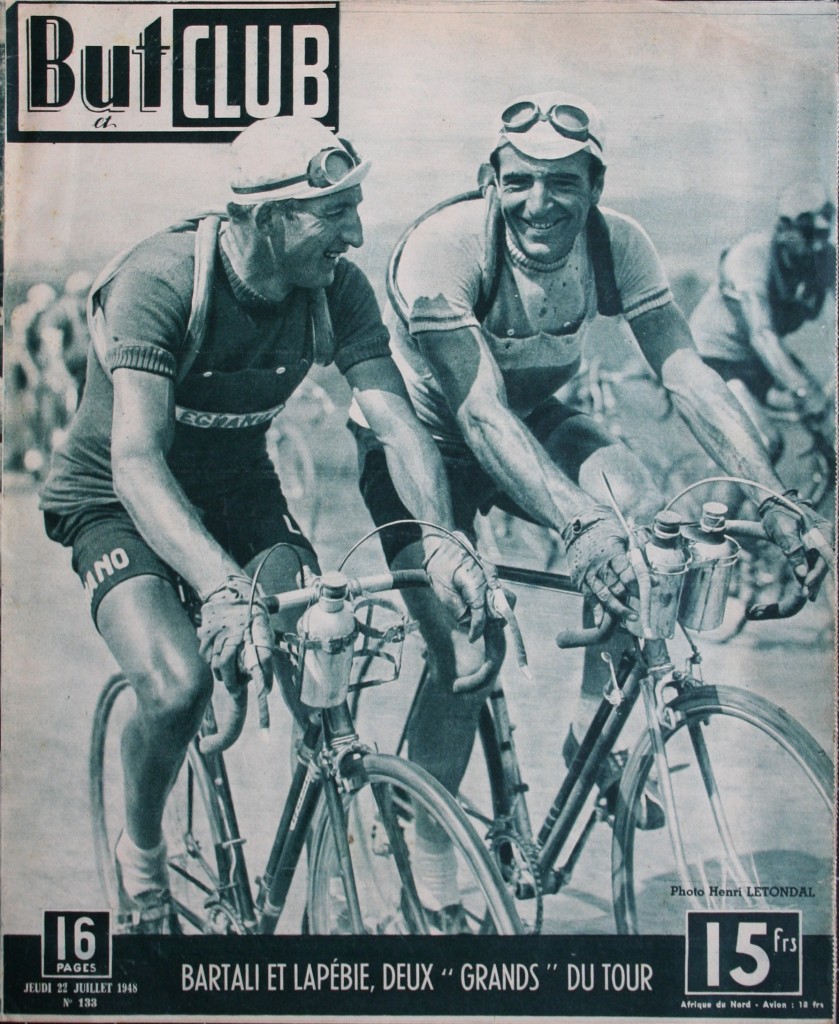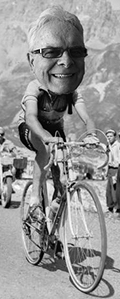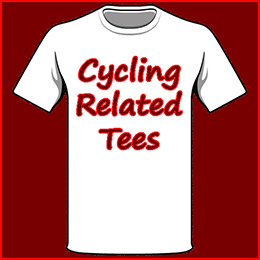Impossible Dreams
 Tue, July 24, 2012
Tue, July 24, 2012 
I’ve spent the last couple of days reflecting on Bradley Wiggins win in the Tour de France, with another British rider, Chris Froome (Albeit born in Kenya.) in second place. Considering there has never been another British rider on the podium before, this is a huge deal.
I thought back to over 60 years ago when I started racing in 1952. I had got my first lightweight bike two years previously when I was 14 years old. I could ride a hundred miles easily, but couldn’t race until I was 16.
So soon after my 16th birthday early in February 1952 I was as fit as a butcher’s dog, and chomping at the bit to go. I won my first club event, a 25 mile time trial. The older more seasoned riders had barely been training for a month at that time, whereas I had ridden right through the winter months.
People started telling me I was good and had great potential; something I had never experienced before in my entire life, no one had ever said I was good at anything. I loved it, I lapped it up, and cycling was my whole world.
The Tour de France was the big event of the year for me even back then. There was no live broadcast on television at that time; even if we had owned a TV. I did get to see a black and white film of highlights from the 1952 Tour when Fausto Coppi won. This was pretty wonderful, I saw it at the annual Bike Show at Earls Court in London.
I would order the French cycling publications, But et Club (Above.) and L’Equipe; these would arrive in the mail about a week after they were published, and through the magic of these often full page photos, sometimes a double page spread; I got to know all the giants of cycling.
In the naivety of my youth I began to dream of one day riding the Tour de France and even winning stages with a long solo break-away. I think this fantasy lasted about a year, when reality set in. In 1953 England’s top time-trialist was Ken Joy, who held competition record for 100 miles in 4 hours, 6 minutes was invited to ride in the Grand Prix des Nations.
This event took place in France, and was considered the unofficial world time-trial championship. There was no World TT Championship at that time. There was much speculation as to how well Ken Joy would do; the event was 142 km, just over 88 miles. We knew Joy could do a 4h, 6m. hundred, so he must be in with a chance.
The event was won by a then unknown 19 year old French rider named Jacques Anquetil. Not only did he beat Ken Joy, he started 16 minutes behind the British rider and caught and passed him. A nineteen year old kid, just two years older than me, had trounced the best that Britain had to offer.
Britain was in its own little world back then when it came to cycle racing. France and the rest of Europe was only a short boat trip across the English Channel, but it might have been half a world away, when it came to the class of racing and the level of competition.
Britain is at a disadvantage anyway when you consider there are no big mountains like the ones in central Europe. But if the only racing available to British cyclists are time-trials held on the flattest courses you can find; avoiding what hills you do have. It is hardly conducive to producing world class riders.
Plus there was no road racing on the open roads in the early 1950s; with the exception of those run by the British League of Racing Cyclists (BLRC) a small group of “Rebels” who had broken away from the National Cyclist Union (NCU) the then British governing body for cycling in the UK.
Road racing was not banned by any law or government decree; but was upheld by the amateur officials of the NCU along with the Road Time Trials Council (RTTC), because the status quo, and their piddling little time-trials suited them. It took a lot of balls for a small group of cyclists, lead by Percy Stallard, in 1942 to say fuck you, we’ll hold our own road races.
The BLRC drug British cycling out of the dark ages, and is the main reason the UK finally has a winner of the Tour de France. From 1948 on, the BLRC entered a team in the Warsaw, Berlin, Prague stage race. This was held behind “The Iron Curtain” and was known as the Peace Race.
In 1952 Scottish rider Ian Steel, who had won the BLRC’s first Tour of Britain race a year earlier, won the Peach Race. This lead to partial recognition of the BLRC by the UCI. The NCU tried to block the vote and walked out of the UCI meeting in protest.
What Percy Stallard and the BLRC did was to alert the UCI that there was a problem within British cycling; the NCU (In cahoots with the RTTC.) was acting in its own self interest and not that of the sport. The UCI had told the NCU to settle its differences with the BLRC or the UCI would recognize the BLRC as the British governing body.
Thus the NCU was forced to amalgamate with the BLRC in 1959 to become the British Cycling Federation (BCF) now British Cycling. The ban on road racing was also lifted at that time, and not a moment too soon. Had it waited until the late 1960s or 1970s it probably wouldn’t have happened because of the interests of the motoring public.
So does it surprise me that it is 60 years since my own “Impossible Dreams” of Tour de France participation, that we finally have a British winner? Not really when I think of all that went before. Percy Stallard died in 2001 a bitter man, and rightly so. He was shafted by the BCF, unrecognized and not asked to manage any international teams; even though he had proved himself as a manager in the Peace Race.
I do hope those early BLRC pioneers will now get the recognition they deserve. Because with all the hard work put in by Bradley Wiggins, Chris Froome, and the whole Sky Team. With all the money put in and the efforts of British Cycling; it still would have not happened, because there would still be no road racing in the UK, had it not been for Percy Stallard and the BLRC.
 Dave Moulton | Comments Off |
Dave Moulton | Comments Off | 






















Reader Comments (9)
Dave great post, I differ from thou in that I never wanted to ride the TDF I was quite happy doing Time Trials. But I do think having to do the 2 yrs in the RAF at the prime time if cycling life age 18 did put a damper on my cycling life. Then "birds"and booze took over! Peter Underwood has many write ups, of chaps that could have ridden and WON the TDF if given the chance, one on Ken Joy also, Of course John Crumps is also on there, wish you would send Peter a write up I am sure many would be interested, www.classiclightweights.co.uk under the Remiss pages.
Wonderful post and as always, you give an unusual perspective on current cycling events, based on your first hand knowledge of the past. I have been reading the British press during the Tour and I did not find many articles as insightful and interesting, maybe The guardian or The times should take notice. Thanks.
Dave,
Thanks for the awesome history lesson of British Cycling and why it took so long for a TdF victory for a British racer. This is something that should have been discussed during the telecast, in my opinion, but I learned it anyways so all is good!
Keep up the great job!
Great article Dave. British cycling was hamperred for too long by thinking that time trialing on flat roads was the zenith of cycling achievement. Riders who were only time trialists have rarely competed well against continental competition. Beryl Burton is maybe the exception.
BTW, Chris Froome was born in Kenya as you point out, but Bradley was born in Belgium.
As a time trialist in the 50s this is what we did, On flat roads? try the Banbury star TT this is far from flat roads. We did massed starts on the park roads plenty of hills, BUT you are right! I would have joined the BLRC but two years in the RAF stopped that. Cycling achievement? your comment about that I think is an insult to Dave Me and all the others that rode our arses off every week.
Not all British time trial courses are completely flat, because not all areas of the British Isles are completely flat. But having said that time trial courses tend to avoid steep hills, whereas road race courses tend to seek out steep hills to make the race more challenging.
Most time trialists in the 1950s rode a single fixed wheel around 81 or 86 inches and on most courses you could climb any hills on such a gear.
The problem was back then a cyclist had to choose one side or the other. If you rode in just one BLRC event you were automatically outlawed and banned from riding RTTC time trials or NCU circuit or track races. I some areas of the country there were few BLRC clubs, so few opportunities to ride League events.
I started off riding time trials, switched to the BLRC in the mid 1950s and rode exclusively road races, until the “Peace Treaty” was signed in 1959, then I could ride both again.
Dave
Very cool post. Fascinating and interesting history. What happens when there are no more story tellers and historians?
In MY feeble mind, The Brit from Kenya would have won the TDF IF NOT FOR Wiggins time trial skills! Time Trials HAVE won TDF before, Also in MY feeble mind Time trials are the HARDEST races, You are on your OWN You vs the clock and the elements! No wheel to grab. No Peleton to hide in, ITS you and ONLY YOU. By the way Brits have ridden in the TDF since 1937 Charles Holland from the Midland C&AC (My CLUB) and Bill Burt started but DNF They rode alone with NO support or sponsors, CHas was a top notch time Trialist, Plus the Milk Race and Tour of Britian that had many riders from the continent. So I think it is a PLUS to be a time trialist. Not a bloody detrement. John Crump
It`s not time trialing but time trialing on specific measured standard courses (10,25,50 miles etc) and the focus on recording the fastest times on these flat courses to win BAR`s and BBAR`s which was the detriement to Britsish riders doing well on the continent. When did a British time trial star ever compete and beat the continentals in true time trialing over non stardard courses and with hills, corners, no traffic etc. I can`t recall ever. Dave Lloyd did well but was not just a time trialist.
There are hiily TT`s in Uk but the flat, billiard table courses are the ones used to win BBAR`s and national competitions.